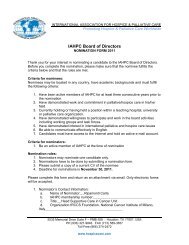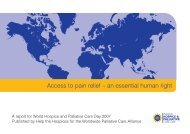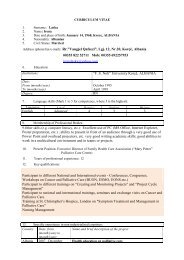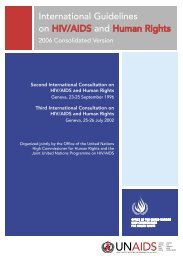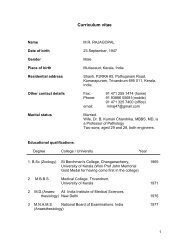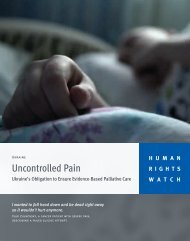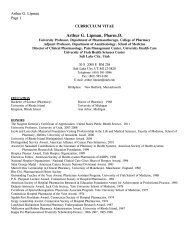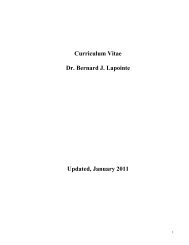INTERIGHTS Bulletin
INTERIGHTS Bulletin
INTERIGHTS Bulletin
Create successful ePaper yourself
Turn your PDF publications into a flip-book with our unique Google optimized e-Paper software.
158<br />
Editorial<br />
Addressing Abuses in Health<br />
Settings: A New Paradigm<br />
<strong>INTERIGHTS</strong> <strong>Bulletin</strong><br />
Volume 16 Number 4 2011<br />
Iain Byrne<br />
The association between medical care<br />
and adherence to a values-based ethical<br />
form of behaviour has a long history –<br />
stretching back over 2,500 years to the<br />
Hippocratic Oath. At the same time<br />
fundamental guarantees, such as the<br />
prohibition of torture and cruel,<br />
inhuman or degrading treatment, are<br />
universal and absolute. In these<br />
circumstances one might expect that it<br />
should be relatively straightforward to<br />
integrate a human rights approach into<br />
healthcare settings to both safeguard<br />
the interests of patients and ensure<br />
effective accountability for abuses.<br />
However, as this edition of the<br />
<strong>Bulletin</strong>, supported by the Open<br />
Society Foundations’ Law and Health<br />
Initiative as part of a campaign to<br />
highlight abuses amounting to torture,<br />
cruel, inhuman or degrading<br />
treatment in healthcare settings,<br />
demonstrates, the reality is very<br />
different. Across the globe millions of<br />
patients frequently experience severe<br />
pain and suffering, abuse, neglect and<br />
prejudice. Often this occurs out of<br />
sight of public consciousness with no<br />
possibility for victims to hold anybody<br />
to account and secure any form of<br />
redress.<br />
Although the focus is on torture and<br />
ill-treatment, many other relevant<br />
rights – health, dignity, due process,<br />
information and participation – are<br />
discussed, reflecting both the<br />
indivisibility and interdependence of<br />
rights and the need for a holistic<br />
approach in delivering patients’ rights<br />
centred healthcare systems.<br />
In a similar vein, viewing abuses in<br />
health settings through the lens of<br />
torture, cruel, inhuman and/or<br />
degrading treatment is not aimed at<br />
stigmatising healthcare providers as<br />
‘torturers.’ Rather, it is to protect<br />
patients and ensure that sufficient<br />
safeguards and accountability<br />
mechanisms are in place. As Jonathan<br />
Cohen and Tamar Ezer, from the Law<br />
and Health Initiative, point out, the<br />
legal implications of a finding of<br />
torture or ill-treatment could be highly<br />
significant in ensuring non-repetition.<br />
In their comprehensive overview of the<br />
issue Cohen and Ezer place the focus<br />
firmly on accountability, particularly in<br />
respect of hidden abuses suffered by<br />
some of the most vulnerable and<br />
marginalised who are often powerless<br />
to take remedial action. Yet, despite the<br />
clear recognition by the UN Human<br />
Rights Committee that patients in<br />
medical institutions should equally be<br />
protected from torture and cruel,<br />
inhuman or degrading treatment as<br />
those in prison or police custody, in<br />
practice there has been very little<br />
attention given to the issue by human<br />
rights bodies.<br />
After demonstrating that the legal<br />
definition of torture and ill-treatment<br />
is broad enough to cover a range of<br />
abuses in health settings, Cohen and<br />
Ezer analyse a non-exhaustive list of<br />
some of the significant examples that<br />
need to be addressed – people needing<br />
pain relief; people with disabilities;<br />
women seeking reproductive health<br />
care; people living with HIV; people<br />
who use drugs; sex workers; lesbian,<br />
gay, bisexual, transgender and intersex;<br />
and the Roma – the common factor<br />
being their vulnerability to abuse and<br />
discrimination due to their status.<br />
Yet, as the authors themselves<br />
highlight, the examples given ‘likely<br />
represent a small fraction of this global<br />
problem.’ In order to shine a light on<br />
this neglected area they urge both<br />
official monitoring bodies and civil<br />
society to strengthen monitoring and<br />
documentation in this area as part of<br />
their routine work. The requirement<br />
for preventive visits to places of<br />
detention under the Optional Protocol<br />
to the Convention Against Torture<br />
(OPCAT) process could and should be<br />
applied to health settings given the<br />
similar nature of abuses and control<br />
frequently exerted in such institutions.<br />
Drawing on her significant experience<br />
as an African human rights lawyer<br />
working at both the domestic and<br />
regional level, Judy Oder’s article<br />
focuses on some of the main<br />
challenges facing healthcare systems<br />
across the Continent. Oder highlights<br />
the lack of accountability as<br />
underpinning many of the serious<br />
problems encountered by patients. In<br />
achieving effective accountability, legal<br />
recognition of the relevant human<br />
rights guarantees is a necessary first<br />
step towards systematic reform of<br />
policies, procedures and practices.<br />
One of the most egregious abuses that<br />
frequently occurs in many African<br />
countries is the detention of poor<br />
patients in medical facilities who<br />
cannot afford to pay their bills. This<br />
includes women who have just given<br />
birth, often resulting in them being<br />
refused further vital follow-up<br />
treatment. It also acts as a significant<br />
deterrent to other expectant mothers<br />
from accessing the medical help they<br />
require. At the heart of the problem is<br />
the state’s failure to fulfil its obligation<br />
to provide free and/or affordable<br />
maternal health care and treatment to<br />
all regardless of ability to pay.<br />
In some instances the healthcare<br />
system appears to have lost complete<br />
sight of what it is there to do, placing<br />
more emphasis on fulfilling<br />
bureaucratic requirements than on<br />
treating patients. Nowhere is this more<br />
exemplified than in the denial of<br />
emergency care to certain vulnerable<br />
groups, such as undocumented



